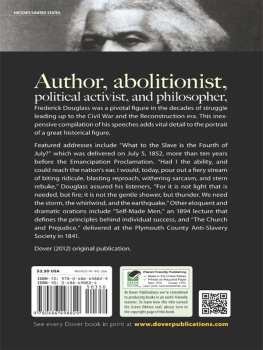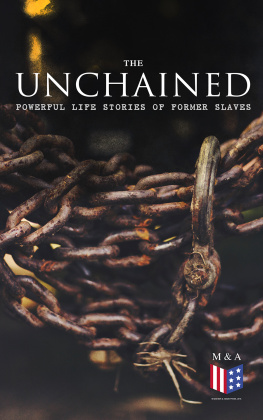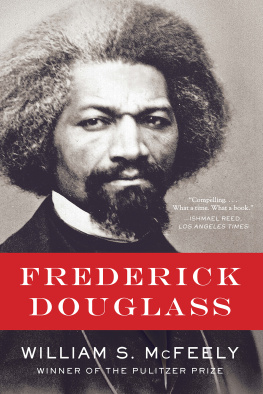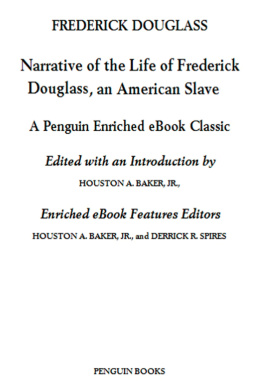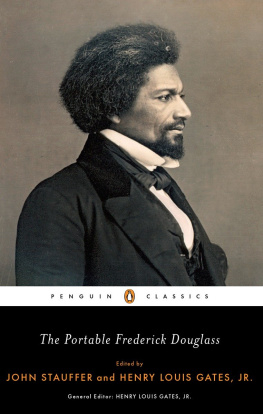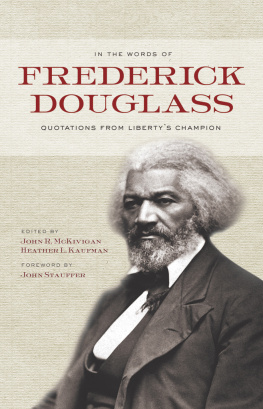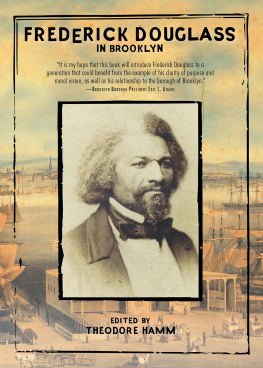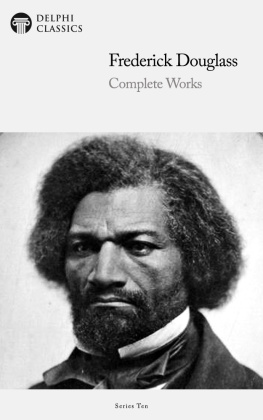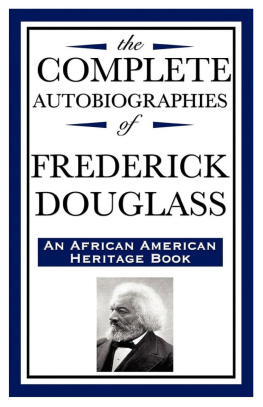Douglass Frederick - Great Speeches by Frederick Douglass
Here you can read online Douglass Frederick - Great Speeches by Frederick Douglass full text of the book (entire story) in english for free. Download pdf and epub, get meaning, cover and reviews about this ebook. City: Mineola;N.Y;United States, year: 2013, publisher: Dover Publications, genre: Science. Description of the work, (preface) as well as reviews are available. Best literature library LitArk.com created for fans of good reading and offers a wide selection of genres:
Romance novel
Science fiction
Adventure
Detective
Science
History
Home and family
Prose
Art
Politics
Computer
Non-fiction
Religion
Business
Children
Humor
Choose a favorite category and find really read worthwhile books. Enjoy immersion in the world of imagination, feel the emotions of the characters or learn something new for yourself, make an fascinating discovery.
- Book:Great Speeches by Frederick Douglass
- Author:
- Publisher:Dover Publications
- Genre:
- Year:2013
- City:Mineola;N.Y;United States
- Rating:4 / 5
- Favourites:Add to favourites
- Your mark:
- 80
- 1
- 2
- 3
- 4
- 5
Great Speeches by Frederick Douglass: summary, description and annotation
We offer to read an annotation, description, summary or preface (depends on what the author of the book "Great Speeches by Frederick Douglass" wrote himself). If you haven't found the necessary information about the book — write in the comments, we will try to find it.
Douglass Frederick: author's other books
Who wrote Great Speeches by Frederick Douglass? Find out the surname, the name of the author of the book and a list of all author's works by series.
Great Speeches by Frederick Douglass — read online for free the complete book (whole text) full work
Below is the text of the book, divided by pages. System saving the place of the last page read, allows you to conveniently read the book "Great Speeches by Frederick Douglass" online for free, without having to search again every time where you left off. Put a bookmark, and you can go to the page where you finished reading at any time.
Font size:
Interval:
Bookmark:


DOVER THRIFT EDITIONS
G ENERAL E DITOR : M ARY C AROLYN W ALDREP
E DITOR OF THIS V OLUME : A LISON D AURIO
Copyright
Copyright 2013 by Dover Publications, Inc.
All rights reserved.
Bibliographical Note
This Dover edition, first published in 2013, is a new selection of the speeches of Frederick Douglass made by James Daley, who also provided the Editors Notes, as well as the Historical Facts which precede each speech.
International Standard Book Number
ISBN-13: 978-0-486-49882-9
ISBN-10: 0-486-49882-4
Manufactured in the United States by Courier Corporation
49882401
www.doverpublications.com
Editors Note
The impact of the life of Frederick Douglass on the history of American civil rights, and on the abolition of slavery, cannot be understated. After being born into slavery in Maryland in 1818, Douglass escaped his life of captivity at the age of 20 before going on to become one of the nations leading abolitionists, activists, authors, and statesmen. During his lauded career, he wrote several autobiographies, advised presidents and politicians, and worked not only for the rights of African Americans, but for the equal treatment of women and other minority groups as well.
Despite his numerous and influential publications, Frederick Douglass was perhaps best known during his life as a consummate orator, sought out the world over to speak on behalf of African Americans and persecuted people everywhere. Spanning over a half-century of American history, his speeches, addresses, and lectures comprise a stunning account of the struggle for equality throughout the 19th century. It is the aim of this anthology to provide a glimpse into this struggle, and the man who toiled so tirelessly for its success.
Beginning in 1841, The Church and Prejudice survives as one of Douglasss most lasting condemnations of the hypocrisy that allowed a supposedly Christian nation to condone the abomination of slavery within its borders. His 1845 address, My Slave Experiences in Maryland, given just one week after completing The Narrative of the Life of Frederick Douglass, provides one of the first instances in which Douglass speaks publicly about his life as a slave. Appeal to the British People, We Have Decided to Stay, What to the Slave is the 4th of July? and A Plea for Free Speech in Boston trace the perils and plights of American slaves during the lead-up to the civil war, while John Brown and Oration in Memory of Abraham Lincoln discuss with great clarity the lives of two men who worked so hard for their freedom. Meanwhile, through What the Black Man Wants, The Race Problem, and Lecture on Haiti, we get a glimpse of Douglasss unceasing work to ensure full equality, both at home and abroad, for African Americans and all freed slaves in the wake of their emancipation.
Finally, in what is perhaps his most passionate and inspirational addressee come to Douglasss famed Self-Made Men. Given many times in numerous venues throughout his life, this speech serves as a lasting call to arms of all people born into lowly means to rise above their meager circumstances, and build a better life through dedication, education, and hard work. The version of this speech included in the present anthology was the last one Douglass gave, delivered just 10 months before his death. In it, he extols the virtues and qualities of Self-Made Men and makes a particular point to describe America as a unique and vital land of opportunity, which, if equal rights are truly achieved by all, can reach its greatest potential: not to become a nation that hands its citizens an equal share of wealth and riches, but a country where all citizens are given an equal chance to achieve greatness on their own.
In his own words:
We have as a people no past and very little present, but a boundless and glorious future. With us, it is not so much what has been, or what is now, but what is to be in the good time coming. Out mottoes are Look ahead! and Go ahead!, and especially the latter. Our moral atmosphere is full of the inspiration of hope and courage. Every man has his chance. If he cannot be President he can, at least, be prosperous. In this respect, America is not only the exception to the general rule, but the social wonder of the world. These causes which make America the home and foster-mother of self-made men, combined with universal suffrage, will, I hope, preserve us from danger. With equal suffrage in our hands, we are beyond the power of families, nationalities, or races. Then, too, our national genius welcomes humanity from every quarter and grants to all an equal chance in the race of life.
It is with this sentiment that Frederick Douglasss words live on as powerful and pertinent today as they were in his own lifetime. While we may have won an end to slavery, universal suffrage, and countless other civil rights battles, there is no doubt that were he still alive today, Frederick Douglass would be speaking and struggling to attain the true freedom and fairness necessary for all men and women, regardless of race, nationality, gender, sexual orientation or income, to be given an equal chance in the race of life."
James Daley
Editor
Contents
In this speech, delivered two decades before the beginning of the Civil War, Douglass describes the hypocrisy often seen at the time in Christian churches throughout the country, wherein many African Americans were not treated the same as whites. It was delivered on November 4, 1841 before the Plymouth County Anti-Slavery Society, in Plymouth, Massachusetts.
At the South I was a member of the Methodist Church. When I came north, I thought one Sunday I would attend communion, at one of the churches of my denomination, in the town I was staying. The white people gathered round the altar, the blacks clustered by the door. After the good minister had served out the bread and wine to one portion of those near him, he said, These may withdraw, and others come forward; thus he proceeded till all the white members had been served. Then he took a long breath, and looking out towards the door, exclaimed, Come up, colored friends, come up! for you know God is no respecter of persons! I havent been there to see the sacraments taken since.
At New Bedford, where I live, there was a great revival of religion not long agomany were converted and received as they said, into the kingdom of heaven. But it seems, the kingdom of heaven is like a net; at least so it was according to the practice of these pious Christians; and when the net was drawn ashore, they had to set down and cull out the fish. Well, it happened now that some of the fish had rather black scales; so these were sorted out and packed by themselves. But among those who experienced religion at this time was a colored girl; she was baptized in the same water as the rest; so she thought she might sit at the Lords table and partake of the same sacramental elements with the others. The deacon handed round the cup, and when he came to the black girl, he could not pass her, for there was the minister looking right at him, and as he was a kind of abolitionist, the deacon was rather afraid of giving him offense; so he handed the girl the cup, and she tasted. Now it so happened that next to her sat a young lady who had been converted at the same time, baptized in the same water, and put her trust in the same blessed Savior; yet when the cup containing the precious blood which had been shed for all, came to her, she rose in disdain, and walked out of the church. Such was the religion she had experienced!
Font size:
Interval:
Bookmark:
Similar books «Great Speeches by Frederick Douglass»
Look at similar books to Great Speeches by Frederick Douglass. We have selected literature similar in name and meaning in the hope of providing readers with more options to find new, interesting, not yet read works.
Discussion, reviews of the book Great Speeches by Frederick Douglass and just readers' own opinions. Leave your comments, write what you think about the work, its meaning or the main characters. Specify what exactly you liked and what you didn't like, and why you think so.

